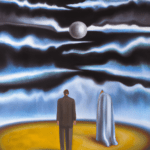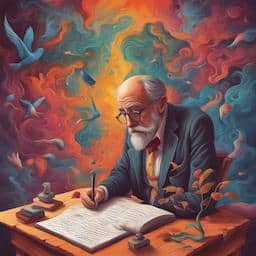Metaphysical fiction is a genre of literature that deals with philosophical, spiritual, and mystical themes. It often incorporates elements of the supernatural, exploring the idea of an otherworldly or metaphysical reality that exists beyond our physical world. The genre can be traced back to ancient mythology and has been popular throughout history, with notable examples including works by William Shakespeare, Edgar Allan Poe, and Franz Kafka. In this article, we will delve into the world of metaphysical fiction, examining the role of the supernatural within the genre and exploring some of the key works that have shaped it.
The Supernatural in Metaphysical Fiction

The supernatural is a common theme in metaphysical fiction, with writers using it to explore the mysteries of life, death, and the universe. The supernatural can take many forms in metaphysical fiction, from ghosts and demons to gods and goddesses, and it is often used as a tool for exploring deeper philosophical and spiritual questions. For example, in Herman Hesse’s “Siddhartha,” the protagonist encounters a wise old ferryman who teaches him about the interconnectedness of all things and the nature of enlightenment. This supernatural encounter helps Siddhartha to understand the mysteries of life and the universe and leads him on a path of spiritual awakening.
Similarly, in Jostein Gaarder’s “Sophie’s World,” the supernatural is used to explore the history of philosophy and the nature of reality. The main character, Sophie, receives mysterious letters that teach her about the great philosophers of history and the different ways in which they have grappled with the question of what is real. As Sophie learns more about philosophy and the nature of reality, she begins to question her own existence and the nature of the world around her. The supernatural elements of the story help to create a sense of wonder and mystery that draws the reader deeper into the philosophical questions being explored.
The Role of Mythology in Metaphysical Fiction
Mythology is also an important element of metaphysical fiction, with many writers drawing on ancient myths and legends to explore deeper spiritual and philosophical themes. For example, Neil Gaiman’s “American Gods” is a modern retelling of ancient myths and legends from around the world, exploring the nature of belief and the power of the gods. The story follows a man named Shadow, who becomes embroiled in a war between the old gods, who are struggling to survive in a world that no longer believes in them, and the new gods, who represent the forces of modernity and technology.
Similarly, in Margaret Atwood’s “The Penelopiad,” the author retells the story of Homer’s “Odyssey” from the perspective of Penelope, the wife of the hero Odysseus. Through this retelling, Atwood explores the role of women in ancient Greek society and the nature of storytelling itself. The supernatural elements of the story, such as the ghosts of the slain suitors haunting Penelope, help to create a sense of mystery and magic that draws the reader deeper into the world of the ancient Greeks.
The Relationship between the Supernatural and Reality
One of the key themes in metaphysical fiction is the relationship between the supernatural and reality. Many writers use the supernatural to explore the idea that there is more to reality than what we can see or touch. For example, in Haruki Murakami’s “Kafka on the Shore,” the protagonist, Kafka, is pursued by a pair of supernatural entities known as the “Crow” and the “Colonel.”
As Kafka journeys deeper into the world of the supernatural, he begins to question the nature of reality and his own existence. The supernatural elements of the story create a sense of mystery and wonder that draws the reader deeper into the questions being explored, blurring the line between what is real and what is imagined.
Similarly, in Isabel Allende’s “The House of the Spirits,” the supernatural is used to explore the idea of destiny and the role it plays in our lives. The story follows the lives of three generations of a family, with the supernatural playing a prominent role throughout. The family’s matriarch, Clara, possesses supernatural powers such as telekinesis and clairvoyance, which she uses to help her family and friends. Through Clara’s powers and the supernatural events that occur in the story, Allende explores the idea that our lives are shaped by forces beyond our control, and that there is a deeper meaning and purpose to our existence.
The Importance of Imagery and Symbolism
Metaphysical fiction often makes use of rich imagery and symbolism to create a sense of mystery and wonder. The supernatural elements of the story are often used to represent deeper philosophical and spiritual themes, and the use of imagery and symbolism helps to draw the reader deeper into these themes. For example, in Hermann Hesse’s “Demian,” the protagonist, Emil Sinclair, becomes obsessed with a mysterious figure named Max Demian, who represents the Jungian archetype of the “wise old man.” Through his encounters with Demian and the imagery associated with him, Sinclair is able to explore his own inner world and come to a deeper understanding of himself and the universe around him.
Likewise, in Gabriel Garcia Marquez’s “One Hundred Years of Solitude,” the supernatural is used to explore the idea of cyclical time and the repetition of history. The story follows the lives of seven generations of a family in a magical and surreal world, with supernatural elements such as ghosts, levitation, and telekinesis playing a prominent role throughout. Through the use of rich imagery and symbolism, Marquez creates a sense of mystery and wonder that draws the reader deeper into the cyclical nature of time and the eternal recurrence of history.
Conclusion
Metaphysical fiction is a genre of literature that explores deeper philosophical, spiritual, and mystical themes through the use of the supernatural. The genre can be traced back to ancient mythology and has been popular throughout history, with many notable works by renowned writers. The supernatural is a common theme in metaphysical fiction, used to explore the mysteries of life, death, and the universe.
Mythology is also an important element of the genre, with many writers drawing on ancient myths and legends to explore deeper spiritual and philosophical themes. The relationship between the supernatural and reality is a key theme in the genre, with writers using the supernatural to question the nature of reality and the meaning of our existence. The use of rich imagery and symbolism is also an important element of metaphysical fiction, helping to create a sense of mystery and wonder that draws the reader deeper into the philosophical questions being explored.
Keywords: metaphysical fiction, supernatural, mythology, philosophy, spirituality, reality, symbolism, imagery.
Check out our Novel Writing Workbooks
Check out Little Tree Food Forest for articles on food forests and homesteading.
Check out FoodieScapes for articles on growing, fermenting and preserving food
Check out StoryScapes.World for articles on writing.
Subscribe to our newsletter to get information delivered to your inbox on how to write a book, outlining your novel, keeping journals, marketing your novel, self-publishing, writing poetry and more.










